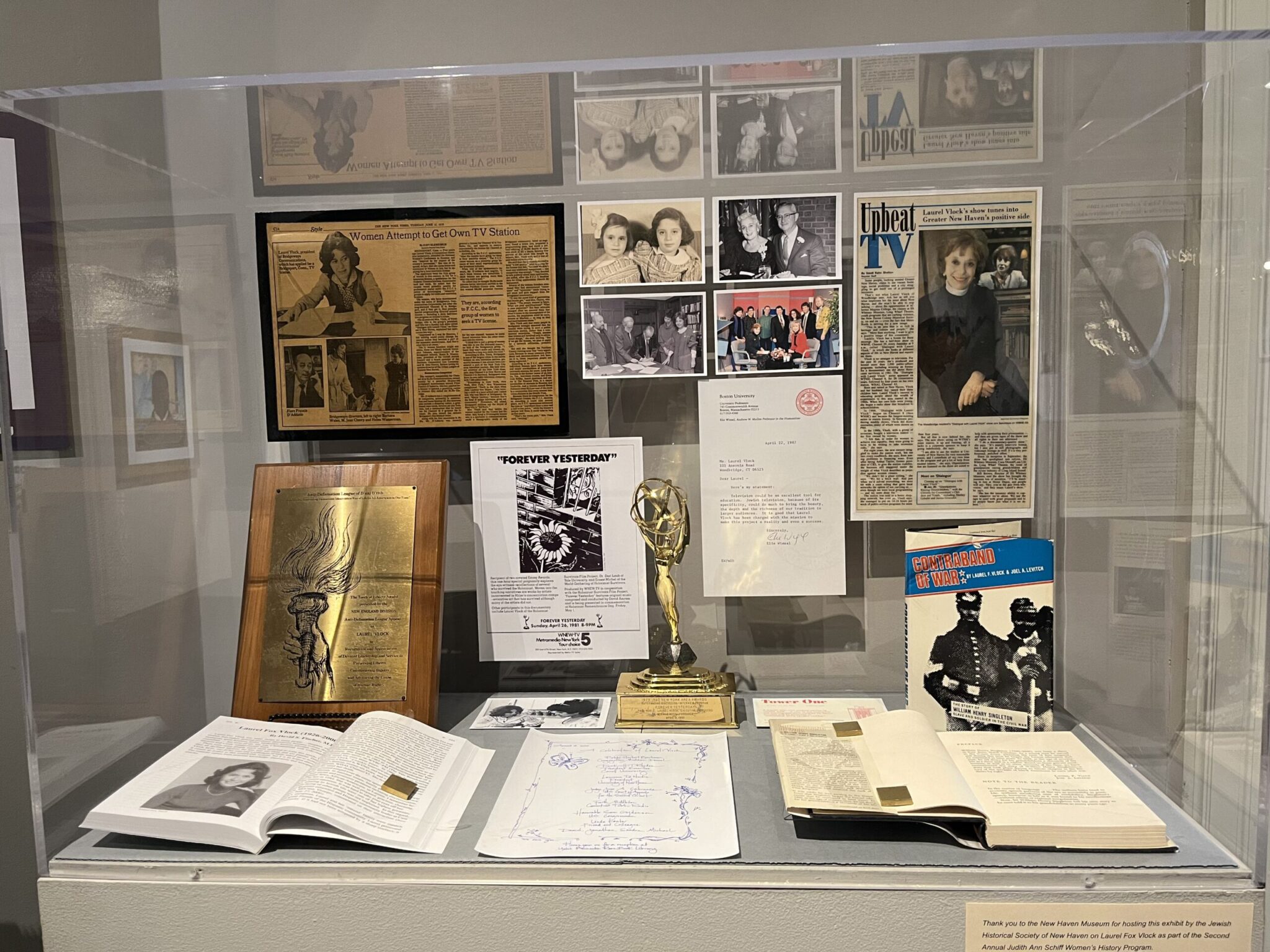Laurel Vlock, pioneering New Haven journalist, honored at New Haven Museum
As part of its programming for Women’s History Month, the museum held an event on Sunday to honor Vlock, who co-founded Yale’s Fortunoff Video Archive for Holocaust Testimonies.

Victoria Siebor, Contributing Photographer
The New Haven Museum honored Laurel Vlock, a trailblazing local journalist and co-founder of Yale’s Fortunoff Video Archive for Holocaust Testimonies, in an event on Sunday.
The event was co-sponsored by the New Haven Museum and the Jewish Historical Society of Greater New Haven. Speakers included family members Marian Fox Wexler and Daniel Vlock, Laurel Vlock’s sister and son, respectively. Stephen Naron, director of the Fortunoff Archive, and Paul Falcone, director of studio operations and media production at the University of New Haven, appeared virtually to share memories about Vlock and her legacy.
Daniel recounted a memory of a road trip the family took through Spain and Portugal when he was 18. He said that Laurel had brought a guidebook to read out loud but kept getting distracted by the sights around her. “For someone whose profession depended on the use of the spoken word, when she got too excited, words would fail her and all she could do was wave her arms, point and say ‘Look look, see see!’” Daniel said. That enthusiasm for life, he added, defined Vlock’s work.
The exhibit on Vlock, who died in a car crash in 2000, includes a display case with photos from her life and the Emmy Award she won in 1981.
The program, entitled “Laurel Vlock: Pioneering Holocaust Filmmaker,” is the second annual Judith Ann Schiff Women’s History Program presentation. The event is named in honor of Schiff, the founder of the Jewish Historical Society of Greater New Haven.
“When we hit Laurel’s name, immediately everybody reached an agreement that that’s who we would like to honor, there’s so much there that we need to share with the community,” Michael Dimenstein, president of the Jewish Historical Society, told the News.
Members of the New Haven Museum, Jewish Historical Society and Vlock’s family held monthly meetings to plan the event.
In 1964, when Yale started its WYBC radio station, Vlock was tapped to create an educational program, “Your Community Speaks,” where she brought speakers into New Haven public school classrooms and recorded their talks. Her success with the initial radio program led to her award-winning “Dialogue with Laurel Vlock” public affairs show on WTNH Channel 8.
The event Sunday showed clips of Vlock interviewing local New Haven activists as well as high-profile figures such as Hillary Clinton and Elie Wiesel on the “Jewish Spectrum” series on the National Jewish Television Network.
Falcone commended Vlock’s continued legacy at the University of New Haven through the Laurel Vlock Video Archive in the Marvin K. Peterson Library. Vlock’s partnership with the University produced more than 230 programs over 30 years, including her work with Jewish Spectrum.
Vlock and Dori Laub, a psychiatrist and child Holocaust survivor, founded the Holocaust Survivors’ FIim Project in 1979. The volunteer-led project began with four interviewers recorded in Laub’s New Haven office. One of their first interviewees was Renee Hartman, whose husband Geoffrey Hartman — a literature professor at Yale — brought the archive to the attention of then-Yale President A. Bartlett Giamatti. Sterling Memorial Library acquired the collection in 1982 with the help of Giamatti, transforming the collection into the Fortunoff Video Archive for Holocaust Testimonies at Yale University.
The archive now contains more than 4,400 video interviews of Holocaust survivors.
“I was sure of the impact of the visual. I was sure of the ability to do this kind of interviewing. I was sure that the technology was there to make it possible. And I was also sure, very frankly, that this was the time. That it was important to do it now. That it was 40 years after the [Holocaust] and that time was indeed running out,” Vlock said in a video from 1982 that was at the exhibit. “What I was very uncertain about was opening old wounds, disturbing personal equilibrium.”
But Laub, she continued, “felt that the survivors — and he is a survivor — were sensing their own mortality and would be ready to come forward.”
Naron credited Vlock for her work in founding the Fortunoff Archive and discussed a fellowship dedicated in her honor that provides funding for a filmmaker-in-residence. Since its launch in 2020, fellows have produced four films and two are currently in production.
“The Fortunoff Video Archive, after all, would simply not exist if it wasn’t for Laurel,” Naron said.
The New Haven Museum will be displaying items gathered by Vlock’s family throughout March, including her Emmy Award for “Forever Yesterday,” a documentary created for WNEW in New York based on the four initial Holocaust survivor interviews. To preserve Vlock’s memory and life’s work, the talks given by Wexler and Daniel Vlock on Sunday were given to the New Haven Museum.
The New Haven Museum is located at 114 Whitney Ave.







